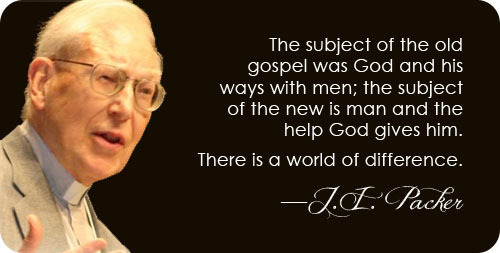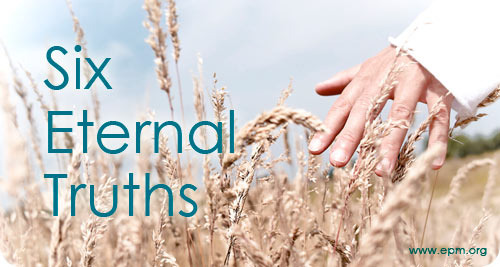Randy Alcorn's Blog, page 195
July 19, 2013
The Old Gospel vs. the New

I love this passage from J.I. Packer, one of my favorite writers, about the true gospel and its purpose. This is from A Quest for Godliness: The Puritan Vision of the Christian Life. He writes:
There is no doubt that evangelicalism today is in a state of perplexity and unsettlement. In such matters as the practice of evangelism, the teaching of holiness, the building up of local church life, the pastor’s dealing with souls and the exercise of discipline, there is evidence of widespread dissatisfaction with things as they are and of equally widespread uncertainty as to the road ahead. This is a complex phenomenon, to which many factors have contributed; but, if we go to the root of the matter, we shall find that these perplexities are all ultimately due to our having lost our grip on the biblical gospel. Without realizing it, we have during the past century bartered that gospel for a substitute product which, though it looks similar enough in points of detail, is as a whole a decidedly different thing. Hence our troubles; for the substitute product does not answer the ends for which the authentic gospel has in past days proved itself so mighty. Why?
We would suggest that the reason lies in its own character and content. It fails to make men God-centered in their thoughts and God-fearing in their hearts because this is not primarily what it is trying to do. One way of stating the difference between it and the old gospel is to say that it is too exclusively concerned to be ‘helpful’ to man—to bring peace, comfort, happiness, satisfaction—and too little concerned to glorify God. The old gospel was ‘helpful’, too—more so, indeed, than is the new—but (so to speak) incidentally, for its first concern was always to give glory to God. It was always and essentially a proclamation of divine sovereignty in mercy and judgement, a summons to bow down and worship the mighty Lord on whom man depends for all good, both in nature and in grace. Its centre of reference was unambiguously God. But in the new gospel the centre of reference is man. This is just to say that the old gospel was religious in a way that the new gospel is not. Whereas the chief aim of the old was to teach people to worship God, the concern of the new seems limited to making them feel better. The subject of the old gospel was God and his ways with men; the subject of the new is man and the help God gives him. There is a world of difference. The whole perspective and emphasis of gospel preaching has changed.

Related Resources
Blog: J.I. Packer and a Tale of a Typewriter
Article: Knowing God by J.I. Packer - read an excerpt
Book: Knowing God
July 17, 2013
Satan, the Original Author of Child-Killing
Some of you have heard by now about the prochoice activists in Texas who earlier this month mockingly chanted “Hail Satan!” during protests against the late-term abortion ban in Texas (which passed last Friday).
Writing for LifeNews.com, Matt Barber says:
I would like to take a moment to pause and personally thank our Satan-hailing friends for their brutally wicked honesty. What may have seemed, at the time, a glib bid to mock the peaceful Christians in attendance has, instead, demonstrated to the world exactly from whom (or what) derives the revolting inhumanity that is all things “pro-choice.”
Understandably, many leftist now complain that this frank display of “pro-choice” allegiance to the prince of darkness has hurt the multi-billion dollar baby-killing biz. They’re right. It has. It’s blown away the smokescreen of euphemistic “pro-choice” rhetoric and propaganda to expose, naked beneath, that which lies at abortion’s inglorious core: Death, death and more death.
You can read the rest of Matt’s article here .
 Jesus called Satan a murderer and liar from the beginning (John 8:44). He murders and he lies to cover his murders. It should come as no surprise that the forces behind child-killing are demonic—after all, abortion is Satan’s attempt to kill God in effigy by destroying the little ones created in God’s image.
Jesus called Satan a murderer and liar from the beginning (John 8:44). He murders and he lies to cover his murders. It should come as no surprise that the forces behind child-killing are demonic—after all, abortion is Satan’s attempt to kill God in effigy by destroying the little ones created in God’s image.
We are not dealing here with “one more social issue,” but a unique and focused evil in which Satan has deeply vested interests.

Related Resources
Blog: The Evidence Doesn't Lie: The Unborn Are Children
Article: Why Should I Speak Up for the Unborn?
Book: ProLife Answers to ProChoice Arguments
July 14, 2013
Six Eternal Truths to Remember Each Day
 A startling thing has happened among modern Christians in the western world. Many of us habitually think and act as if there is no eternity—or, as if what we do in this present life has no bearing on eternity.
A startling thing has happened among modern Christians in the western world. Many of us habitually think and act as if there is no eternity—or, as if what we do in this present life has no bearing on eternity.
The trend today is to focus not on our eternal future (who cares about the “sweet bye and bye”?) but our present circumstances, as if this world were our home. Yet Scripture states the reality of our eternal future should dominate and determine the character of our present life, right down to the words we speak and the actions we take (James 2:12; 2 Peter 3:11–12).
Let’s be sure to remind ourselves today—and every day—of “the real thing.” Here are six eternal truths to remember:
1. There are only two eternal destinations—Heaven or Hell—and I and every person I know will go to one or the other.
Enter through the narrow gate. For wide is the gate and broad is the road that leads to destruction, and many enter through it. But small is the gate and narrow the road that leads to life, and only a few find it (Matthew 7:13–14).
Both Heaven and Hell touch Earth—an in-between world leading directly into one or the other. The best of life on Earth is a glimpse of Heaven; the worst of life is a glimpse of Hell. For Christians, this present life is the closest they will come to Hell. For unbelievers, it is the closest they will come to Heaven.
The reality of the choice that lies before us in this life is both wonderful and awful. Given the certainty of our two possible destinations, shouldn’t every person be willing to pay any price to avoid Hell and go to Heaven? And yet, the price has already been paid. “You were bought at a price” (1 Corinthians 6:20). The price paid was exorbitant—the shed blood of God’s Son, Jesus Christ.
Consider the wonder of it: God determined that He would rather go to Hell on our behalf than live in Heaven without us. He so much wants us not to go to Hell that He paid a horrible price on the cross so that we wouldn’t have to.
All roads do not lead to Heaven. Only one does: Jesus Christ. He said, “No one comes to the Father except through me” (John 14:6). All other roads lead to Hell. The reality of Hell should break our hearts and take us to our knees and to the doors of those without Christ.
2. This world (as it is now) is not my home and everything in it will burn, leaving behind only what’s eternal.
The heavens will disappear with a roar; the elements will be destroyed by fire, and the earth and everything done in it will be laid bare. Since everything will be destroyed in this way, what kind of people ought you to be? You ought to live holy and godly lives as you look forward to the day of God and speed its coming (2 Peter 3:10–12).
Earth has been damaged by our sin (Genesis 3:17). Therefore, the earth as it is now (under the Curse) is not our home. The world as it was, and as it will be, is our home. We are pilgrims in this life, not because our home will never be on Earth, but because our eternal home is not currently on Earth. It was and it will be, but it’s not now.
God says this present earth will be consumed by fire (2 Peter 3:10). Paul says the fire of God’s holiness will consume whatever we’ve done that amounts to wood, hay, and straw. But he tells us there’s something that will survive the fire and go right into the new heavens and new earth—works of gold, silver, and precious stones (1 Corinthians 3:12).
What will last for eternity? Not your car, house, degrees, trophies, or business. What will last for eternity is every service to the needy, every dollar donated to feed the hungry, every cup of cold water given to the thirsty, every investment in missions, every prayer for the needy, every effort spent in evangelism, and every moment caring for precious children—including rocking them to sleep and changing their diapers. The Bible says we’ll reap in eternity what we’ve planted in this life (Galatians 6:7–8).
3. My choices and actions in this life have a direct influence on the world and the life to come.
Behold, I am coming soon, bringing my recompense with me, to repay everyone for what he has done (Revelation 22:12).
 What we do in this life is of eternal importance. You and I will never have another chance to move the hand of God through prayer to heal a hurting soul, share Christ with one who can be saved from hell, care for the sick, serve a meal to the starving, comfort the dying, rescue the unborn, translate the Scriptures, bring the gospel to an unreached people group, further God’s kingdom, open our homes, or share our clothes and food with the poor and needy.
What we do in this life is of eternal importance. You and I will never have another chance to move the hand of God through prayer to heal a hurting soul, share Christ with one who can be saved from hell, care for the sick, serve a meal to the starving, comfort the dying, rescue the unborn, translate the Scriptures, bring the gospel to an unreached people group, further God’s kingdom, open our homes, or share our clothes and food with the poor and needy.
When we view today in light of the long tomorrow, the little choices become tremendously important. Whether I read my Bible today, pray, go to church, share my faith, and give my money—actions graciously empowered not by my flesh but by His Spirit—is of eternal consequence, not only for other souls, but for mine.
4. My life is being examined by God, the Audience of One, and the only appraisal of my life that will ultimately matter is His.
So then each of us will give an account of himself to God (Romans 14:12).
Ask yourself whether you are living for the approval of this culture, or for the approval of Jesus. Then ask yourself, “In the end whose judgment seat will I stand before?” We are to live out our lives before the Audience of One. His approval is the one that matters. If our goal is to hear others say, “Well done,” we won’t do what we need to do to hear Him say it.
We should remind ourselves of what the Bible says about being fools for Christ (1 Corinthians 1:18–31; 4:8-13). The question is not whether we will be seen as fools—that part is certain—but when and to whom we will be seen as fools. Better to be seen as fools now in the eyes of other people—including other Christians—than to be seen as fools forever in the eyes of the Audience of One.
5. God is sovereign, and I can trust that He is working all things—including the most difficult things—in my life together for good.
And we know that for those who love God all things work together for good, for those who are called according to his purpose (Romans 8:28).
In the midst of a world that groans under suffering and evil, God’s main concern is conforming His children to the image of Christ. And He works through the challenging circumstances of our lives to help develop that Christlikeness in us. We can be assured that whatever difficulty He has allowed in our lives has been Father-filtered, through His fingers of wisdom and love.
Perhaps the greatest test of whether we who are Christ’s followers believe the truth of Romans 8:28 is to identify the very worst things that have ever happened to us, then to ask whether we believe God will in the end somehow use those things for our good. The Bible is emphatic that He will. We have no reason to think He’ll be any less trustworthy concerning this than with any other promise He has made. By faith let’s trust Him today that in eternity we’ll look back and see, in retrospect, how Romans 8:28 was absolutely true!
6. My ultimate home will be the New Earth, where I will see and enjoy God and serve Him as a resurrected being in a resurrected human society.
 But according to his promise we are waiting for new heavens and a new earth in which righteousness dwells (2 Peter 3:13).
But according to his promise we are waiting for new heavens and a new earth in which righteousness dwells (2 Peter 3:13).
Is resurrected living in a resurrected world with the resurrected Christ and his resurrected people your daily longing and hope? Is it part of the gospel you share with others? Paul says that the resurrection of the dead is the hope in which we were saved. It will be the glorious climax of God’s saving work that began at our regeneration. It will mark the final end of any and all sin that separates us from God. In liberating us from sin and all its consequences, the resurrection will free us to live with God, gaze on Him, and enjoy His uninterrupted fellowship forever, with no threat that anything will ever again come between us and Him.

Related Resources
Blog: Spend Your Day with Eternity in Mind
Video: What do we know about Heaven?
Book: Heaven
This article orginally appeared in EPM's summer 2013 Eternal Perspectives magazine. You can read the full issue online.
Image credits: field - dimitri_c via sxc.hu | Bible reading - abcdz2000 via sxc.hu
July 12, 2013
Can a graphic novel be Christ-honoring and gospel-centered?
 In today’s blog, I’d like to recognize the fact that the graphic novel form is not widely recognized among Christians, including pastors, ministry leaders and bookstore owners. In fact, I’ve found there’s a common stereotype among believers that a graphic novel is inherently immoral, theologically unsound, and undermines rather than uplifts God’s Word, Christ, and the gospel.
In today’s blog, I’d like to recognize the fact that the graphic novel form is not widely recognized among Christians, including pastors, ministry leaders and bookstore owners. In fact, I’ve found there’s a common stereotype among believers that a graphic novel is inherently immoral, theologically unsound, and undermines rather than uplifts God’s Word, Christ, and the gospel.
It’s true that secular graphic novels frequently have themes and content that dishonor God. But there are exceptions to this. Kingstone Media is a Christian publisher, founded by a pastor, dedicated to producing quality graphic novels that are biblically sound and Christ-centered. (Check out their website to browse their books.) The popular Action Bible, which my grandsons love and has sold a half million copies, has also proven that this format can be both engaging and Christ-honoring at the same time.
Still, many readers just don’t believe that graphic novels are serious, valuable, or impactful books, nor do they think they are sufficiently moral, family-friendly, and biblical. Because of that stereotype, I’m grateful that God graciously provided two endorsements for Eternity from the presidents of the most trusted family-building programs in all of Christian radio, Focus on the Family and FamilyLife Today. Here’s what they had to say:
Eternity brings a familiar biblical story to light in an engaging and powerful way!
— Jim Daly, President, Focus on the Family
I LOVE Randy Alcorn’s Eternity because it touches my grandchildren’s lives with the truth of Scripture in a compelling format. My ten year old granddaughter Savannah said, “I would tell all my friends to read this book!”
— Dennis Rainey, President of FamilyLife Today
I appreciate these endorsements showing Eternity to be a good family book, which is not something people often think of with graphic novels.
But can a graphic novel really have sound theological content? Consider this endorsement from Dr. Gerry Breshears, Chairman and professor of Systematic Theology, Western Seminary, past president of the Evangelical Theological Society, and co-author with Mark Driscoll of Doctrine and Vintage Jesus:
Jesus spoke in the language of real people. His stories used everyday elements to convey eternal truth with a power that reached to the deepest emotions of the heart as well as the mind and spirit. Randy Alcorn does the same in this graphic portrayal of Jesus’ parable. Using pictures and words, symbol and narrative, he reaches to the core of people whom his other excellent books will not touch. Even we geeks will find this book exciting!
As for the gospel-centered aspect of the book, and kids being eager to read it, let me tell you a story from this past weekend. I was playing tennis with a friend at public courts. Two kids were there, maybe 10 and 12. I gave them Eternity. I showed them the art, including Christ on the cross, and his resurrection. I told them the artist has done a lot of work with Marvel Comics. Their eyes were big, and they were delighted to receive it.
They asked if I’d written other graphic novels, and I said, "No, but I'm writing another one, the story of the Apostle Paul." They looked at me blankly, so I asked if they had heard of the Apostle Paul. They shook their heads so I told them how he had hated Christ but came to be his follower. They kept flipping through Eternity and asking me questions.
 Then, there were two teenagers on the court next to us, one Hispanic, the other Asian. When they were leaving, I gave one of them the book, and he started reading it on the spot, and kept reading as he walked to his car. Then the two of them came all the way back to the courts and asked me if I would sign it for him. I did just what I’d done with the younger boys ninety minutes earlier. I showed them Christ’s crucifixion and resurrection, and talked about Jesus dying for our sins. I asked the other guy if he wanted a book too, and his eyes lit up as he said, "Sure!"
Then, there were two teenagers on the court next to us, one Hispanic, the other Asian. When they were leaving, I gave one of them the book, and he started reading it on the spot, and kept reading as he walked to his car. Then the two of them came all the way back to the courts and asked me if I would sign it for him. I did just what I’d done with the younger boys ninety minutes earlier. I showed them Christ’s crucifixion and resurrection, and talked about Jesus dying for our sins. I asked the other guy if he wanted a book too, and his eyes lit up as he said, "Sure!"
Then, I asked these guys if either of them have a church they attend. They shook their heads. I asked my friend about a good church nearby, and he recommended one and said it had lots of kids their age. I encouraged the guys to attend. They seriously appeared very interested. My buddy pinpointed the church's location, and they said they might check it out. I encouraged them to send me an email after reading the book.
I've given away a ton of books to countless people over the years, but I've never had one before that unbelieving young people get so animated about. As I write this, there's no doubt in my mind that two boys and two young men, in the last 48 hours, read cover to cover a book that clearly conveys the gospel of God's grace! These are kids who don't go to church and don't know who the Apostle Paul is, and likely have just heard the gospel for the first time ever! I can’t tell you how much joy that gives me!
I’d encourage you to pick up a copy of Eternity or one of Kingstone’s other graphic novels and read it yourself. If you’ve never read a comic or graphic novel, I predict you’ll be pleasantly surprised at how much you like it—and find it Christ-honoring. And I hope it will give you a vision for all the young people in your life you want to reach with the gospel.

P.S. You may be interested in other endorsements of Eternity, including from Max Lucado, Jerry Jenkins, and Frank Peretti.
Partner with EPM in Sharing the Book (Plus a Special Offer)
We want to encourage you to read Eternity yourself (if you've never read a graphic novel, we predict you'll like it!) and to catch the vision of how you can share it with others. Here's four ways you can partner with us in sharing the book:
1. A "Buy-two-get-one-free" special
Purchase three paperback Eternity books from www.epm.org/eternity (retail $16.99, EPM price $13.59 per book), and during checkout, use the discount code eternityblog to deduct the full price of one book. Offer ends July 31, 2013. Limit one free book per order.
2. Send us your stories
We'd love to hear your stories of how God has used the book to impact readers. Send them to us online.
3. Support our “Books for Prisoners” fund
Help us send the book to prisoners nationwide. Donate online at www.epm.org/donate (under "Special Funds" select "Books for Prisoners”).
4. Join our Facebook party on Thursday, July 25
When: Thursday, July 25 from 5:30 to 7 p.m. PT (8:30 to 10 p.m. ET)
Where: Randy's Facebook page (www.facebook.com/randyalcorn)
What: Join us on Randy’s Facebook page to celebrate Eternity, the graphic novel. Ask questions and interact with Randy, plus get a behind-the-scenes look at the creation of the novel and receive a special offer from EPM. Did we mention we’re giving away prizes to those who participate? You won’t want to miss it!
July 10, 2013
Seeing and Fearing God
John Donne wrote, “As he that fears God, fears nothing else. So he that sees God, sees everything else.”
In this video and the following transcript, I share some related thoughts:
There’s several components to Donne’s quote. One is that if you fear God, you don’t have to be afraid of anyone else. We’re all going to fear somebody. The question is, who?
 It’s like when people talk about not feeling comfortable with the idea of fearing God. Well, get used to it. Scripture says we’re supposed to fear God, even though, yes, He’s our Father and some people quote 1 John 4:18 (“Perfect love casts out fear”). That is true, but we’re still told that in the right way, we’re to realize that God judges sin. If we sin, we should fear the natural consequences that are going to come out of that. So, when you fear God, you don’t have to fear anything else.
It’s like when people talk about not feeling comfortable with the idea of fearing God. Well, get used to it. Scripture says we’re supposed to fear God, even though, yes, He’s our Father and some people quote 1 John 4:18 (“Perfect love casts out fear”). That is true, but we’re still told that in the right way, we’re to realize that God judges sin. If we sin, we should fear the natural consequences that are going to come out of that. So, when you fear God, you don’t have to fear anything else.
Likewise, when you see God, you can see everything else. I would relate that to something C.S. Lewis said, where he talked about light coming into a tool shed. When you see the light come in, it’s not simply that you see light. It’s that you now see everything else in the tool shed because of that light.
We see the whole world in the light that God brings us. In fact, in John 1:9 it says that Christ came into the world and He was the true light that enlightens everyone. Even the unbeliever, as a result of Christ’s incarnation in some way that we don’t even totally understand, is enlightened through His redemptive life and death. We’re able to see things as they really are.
Some people are always trying to work out their worldview and ask “What’s your opinion of this?” and “How do I look at this and how do I look at that?” What we really need is to see God and to contemplate His attributes. When we see God as He truly is, then when we look around and see ourselves and other people and the world, we’ll see all of that in light of God who we behold.

Related Resources
Blog: The Fear of God
Article: Is God Safe?
Book: We Shall See God
July 8, 2013
How should a Christian guy pursue a relationship with a Christian girl?
Brandon Andersen with The Resurgence has written great advice to men on relationships. Here's a summary of his article with some of his quotes, and then my own thoughts added in.
Be intentional
The intentional man repeatedly and constantly goes first and takes on all of the risk of rejection. He always lets the girl know where he stands so she feels secure and isn’t left guessing. (On the other hand, don’t weird her out by talking about marriage on the first date.)
I agree. Male leadership wasn’t the result of the Fall, but of creation (as Genesis implies and Paul makes clear in 1 Timothy 2). Loving servanthood should be a man’s goal.
Clean your act up today, not "when"
The lie is that once you find the right girl, all your problems will go away—you just need the right motivation, right? Wrong! If Jesus isn’t motivation enough to grow in maturity and pursue godliness, then you are not ready to pursue a woman.
This is great advice. Joshua 1:8 says, “This Book of the Law shall not depart from your mouth, but you shall meditate on it day and night, so that you may be careful to do according to all that is written in it.” Every man needs to realize that he will only be worth following if he follows God.
God wants to use the next years of your life to send your roots deeper into His Word, deeper into a walk with Christ. He wants you to draw from the reservoir of a solid Christian life, with strong personal accountability to godly men, and from that reservoir to stand strong for Jesus. Satan, on the other hand, wants to mess you up with pride, sexual impurity and every other thing he can do to discredit your testimony for Christ and derail you from serving Him, and from one day having a godly marriage.
Plan ahead
Don’t spend time with your girlfriend without a plan. Decide ahead of time the prudent time to say goodnight and where you should go.
Gaps always get filled, often with temptations to sexual impurity. Know what you’re doing and either stick with the plan or go somewhere safe, where you’re in the sight of others (particularly others who respect the need for purity). You can still have a private conversation even in a room full of people. But their presence will encourage you to focus on the conversation rather than on temptation to impurity.
Guard her heart
A mature man knows that the person that can do the most damage to a woman’s heart is him, and he takes that very seriously.
Philippians 2:3-7 says, “Do nothing out of selfish ambition or vain conceit, but in humility consider others better than yourselves. Each of you should look not only to your own interests, but also to the interests of others. Your attitude should be the same as that of Christ Jesus, who...made himself nothing, taking the very nature of a servant.”
Be very careful about physical touch
The Bible only outlines two categories for Christian women in relation to Christian men: either she is a sister in Christ or she is your wife. There isn’t a middle ground.
I would also encourage you to read through an article I’ve written that contains Guidelines for Sexual Purity. It’s material that I’ve presented to many young people and their parents over several years. When my now married daughters were teenagers, I honed it further for sharing and discussion with them and the young men who asked to date them.
 One of the things I say in that article is that it’s essential to realize that your date is your sister in Christ—NOT your “lover.” “Treat older women as mothers, and younger women as sisters, with absolute purity” (1 Timothy 5:2). Don’t go into dating with the goal of romance, but the goal of spending time with your sister. When you begin a relationship, a rule of thumb is, don’t do anything physically you wouldn’t do with your sister by birth.
One of the things I say in that article is that it’s essential to realize that your date is your sister in Christ—NOT your “lover.” “Treat older women as mothers, and younger women as sisters, with absolute purity” (1 Timothy 5:2). Don’t go into dating with the goal of romance, but the goal of spending time with your sister. When you begin a relationship, a rule of thumb is, don’t do anything physically you wouldn’t do with your sister by birth.
If a Christ-centered and positive relationship develops, then you might move to cautious displays of affection such as hand-holding. But be alert to the difference between appropriate affection and intimacy. You must stay safely back from the line where either one is propelled toward sexual intimacy. It’s very hard to move back once you’ve crossed a line—so don’t cross it in the first place.
This person may end up being a lifelong friend, or married to your best friend. Don’t do anything with her that would cause you to be embarrassed or self-conscious if you end up being best man at her wedding.
It's important that throughout your relationship, you stay close to godly people who can give you advice based on God’s Word and who love you enough to tell you the truth...even when it hurts. One of the things I say in several of my books is that what is right is always smart, and what is wrong is always stupid. That which is for God’s glory is also always for our good.
Finally, let me recommend a great book by a man I respect, Voddie Baucham Jr. It’s called What He Must Be: ...If He Wants to Marry My Daughter. Whether or not God calls you and this woman together for the long haul, Voddie offers excellent counsel for you as you prepare for the future God has for you.

Related Resources
Blog: The Millennial Generation and Sexual Sin
Article: Guidelines for Sexual Purity
Book: The Purity Principle
This article orginally appeared in EPM's summer 2013 Eternal Perspectives magazine. You can read the full issue online.
Photo credit: EdwinP via sxc.hu
July 5, 2013
Why do Christians need to accept the whole Bible?
In an interview with Julia Stager, EPM staff member, she quotes A. W. Tozer who said, “Nothing less than a whole Bible can make a full Christian.”
We share some thoughts in this video and the following transcript:
Randy:
Great question. I think God has revealed to us what Scripture calls the whole counsel of God. Paul says in Acts 2:27, “for I did not shrink from declaring to you the whole counsel of God.” We’re not to preach just from our favorite portions of the Word, but all of it.
 I think that is so critically important. Thomas Jefferson, who was a deist (not a Christian), had a cut and paste Bible. He literally cut out the portions of the Bible he liked and pasted them into a book. It became kind of the Thomas Jefferson Bible.
I think that is so critically important. Thomas Jefferson, who was a deist (not a Christian), had a cut and paste Bible. He literally cut out the portions of the Bible he liked and pasted them into a book. It became kind of the Thomas Jefferson Bible.
Without actually doing that physically, that’s what a lot of us end up doing in practice. We take those portions we like, such as all the portions about God’s love, eternal life, being happy and all these kinds of things, and leave out the irritating or disturbing portions—those pesky little things like suffering, eternal hell, accountability and standing before the judgment seat of Christ.
But we need the whole Bible.
Julia:
It’s tempting to just read the parts that we like. But then, like you’re saying Randy, the danger is living this “less than” Christian life. Because if the whole Bible is the whole counsel of God and all of it is truth, then to live based on half the Bible is to live not full of the truth. It’s only basing your life on half of the real truth.
Randy:
I have a lot of verses in my favorite Bible that I have underlined. Every once in a while I make myself look at the verses I haven’t underlined. I ask myself, “Why didn’t I underline that? What truth does God have for me there?”

Related Resources
Blog: God's Word as Our Primary Influence
Article: A Surprise Endorsement for Doctrine
Product: Eternity 101 DVD Set
Photo credit: doc_ via sxc.hu
July 3, 2013
Sharing the Message of Eternity
 As I shared in a blog last week, I have a missional perspective on my graphic novel Eternity. God has laid on my heart a vision for seeding the book far and wide because it includes a clear gospel presentation, embodied in a parable of Jesus into which I’ve woven depictions of Heaven and Hell. The art is exceptional. I’ve looked at a number of graphic novels, and have seen nothing like it.
As I shared in a blog last week, I have a missional perspective on my graphic novel Eternity. God has laid on my heart a vision for seeding the book far and wide because it includes a clear gospel presentation, embodied in a parable of Jesus into which I’ve woven depictions of Heaven and Hell. The art is exceptional. I’ve looked at a number of graphic novels, and have seen nothing like it.
I would appreciate your prayers as this book is distributed. Our ministry is giving away thousands of copies from the first printing to prisoners, Christian camps, youth ministries, and various missions organizations, including Operation Mobilization’s Logos Hope ship which will bring it into ports in many countries. (The short word count and visual images are appealing to the huge number of young people in the world who know English as a second language.) It will also be translated, we hope, into many languages.
By God’s grace our ministry already sends over 1,000 books each month to prisoners. This one will be read by thousands of prisoners, many who find it hard to read conventional books. (By the way, when people are drawn to the gospel, and come to Christ through unconventional reading material THEN there is reason to hope they will become readers of conventional books, starting with God’s Word!) The book ends with encouraging them to get connected with a Bible-teaching Christ-centered church, which our staff will help them locate in their area. We have done this many times, and the results have been very encouraging.
If God lays it on your heart to help partner with our ministry in sending Eternity and my other books to prisoners, you may donate online (choose the option "Books for Prisoners Fund" under Special Funds) or send a check to EPM designated “books for prisoners” on the memo line. 100% of the donations to this fund will be used to finance the cost of the books and materials, as well as the shipping charges.
Above all, we would value your prayers. EPM’s staff is asking the Lord to bless our efforts and use this book for His glory and kingdom purposes by transforming many lives.

“In the not too distant future, every one of us will move from time into eternity. May God use Randy Alcorn’s graphic novel Eternity to reach a lost and dying generation while there’s still time.”
— Ray Comfort, host of “The Way of the Master,” author of The Beatles, God and the Bible
“Eternity is a stunning achievement—dramatic, addictive, and an exciting way to make Scripture come alive. I’m predicting a huge, growing ministry that will get the Bible into the hands of people who just like a riveting story. I’ll be buying a lot of these to give away.”
— Jerry B. Jenkins, Novelist & Biographer; Owner, Christian Writers Guild
Partner with EPM in Sharing the Book (Plus a Special Offer)
We want to encourage you to read Eternity yourself (if you've never read a graphic novel, we predict you'll like it!) and to catch the vision of how you can share it with others. Here's four ways you can partner with us in sharing the book:
1. A "Buy-two-get-one-free" special
Purchase three paperback Eternity books from www.epm.org/eternity (retail $16.99, EPM price $13.59 per book), and during checkout, use the discount code eternityblog to deduct the full price of one book. Offer ends July 31, 2013. Limit one free book per order.
2. Send us your stories
We'd love to hear your stories of how God has used the book to impact readers. Send them to us online.
3. Support our “Books for Prisoners” fund
Help us send the book to prisoners nationwide. Donate online at www.epm.org/donate (under "Special Funds" select "Books for Prisoners”).
4. Join our Facebook party on Thursday, July 25
When: Thursday, July 25 from 5:30 to 7 p.m. PT (8:30 to 10 p.m. ET)
Where: Randy's Facebook page (www.facebook.com/randyalcorn)
What: Join us on Randy’s Facebook page to celebrate Eternity, the graphic novel. Ask questions and interact with Randy, plus get a behind-the-scenes look at the creation of the novel and receive a special offer from EPM. Did we mention we’re giving away prizes to those who participate? You won’t want to miss it!
July 1, 2013
You May Choose to Look the Other Way, But…
In this video interview with Julia Stager, EPM staff, she quotes William Wilberforce who said, “You may choose to look the other way, but you can never say again that you did not know”, and asks what that quote means to me.
In the following video and transcript, I share some thoughts:
Historically, William Wilberforce was an abolitionist in England. He was a committed Christian who wanted to free all the slaves and abolish the slave trade. He was ultimately successful. His story is told in many places, including in the popular movie Amazing Grace. He had a relationship with John Newton (who wrote the song Amazing Grace) and Newton had a great influence on him.
 But I think Wilberforce was saying here that when you see the realities of the slave trade, you can never go back. He used to stand up in Parliament, and would keep slave chains under his seat and pull them out and drape them around himself as he was speaking. He was so unpopular. Everybody was against him. Hardly anyone was in favor of abolishing the slave trade when he first spoke against it. But then, over time, he was successful. Literally just a few days before he died, slavery was abolished in England.
But I think Wilberforce was saying here that when you see the realities of the slave trade, you can never go back. He used to stand up in Parliament, and would keep slave chains under his seat and pull them out and drape them around himself as he was speaking. He was so unpopular. Everybody was against him. Hardly anyone was in favor of abolishing the slave trade when he first spoke against it. But then, over time, he was successful. Literally just a few days before he died, slavery was abolished in England.
So how can we apply that quote today? How do you see that as still relevant?
When you see something evil, you see the reality of it. There’s no going back or denying it. That’s the way it should be anyway. I would apply that to something like sex trafficking. You read about it and watch a film of some of the things that are happening. You see it devastating the lives of children who are being used in such horrific ways. There should be no turning back.
The same is true when you see children who are dying of hunger and diseases that are treatable, or kids that need clean water. Once you see that, there should be no denying it.
And, of course, the big overlooked area today is abortion. I encourage everyone to look online at pictures of aborted children. It’s horrific. (A wonderful ministry called Abort 73.com has produced a simple two minute video showing the objective truth about abortion.)
But from that point forward when you see the truth, you should never go back. We should always speak up for those who cannot speak for themselves.

Related Resources
Blogs: The Least of These
Article: Amazing Grace in the Life of William Wilberforce
Book: Why ProLife?
June 28, 2013
My Eternity Graphic Novel and the Unreached People Group in Our Midst

Before I get to today’s blog, I wanted to share an update on EPM’s finances for those who are interested. We are not panicking and we do not ever beg for money, but we are asking God to provide and I felt I should share our current situation with His people. If and only if you’d like to read more, you can do so here.
In last week’s blog, I introduced Eternity, my first graphic novel. Here’s a two-minute book trailer created by the publisher, Kingstone. Love the voice, don’t you?
I really have a missional perspective on this book. In a way, though it’s in English, because of its visual nature it’s like a translation into another language, a language that some people speak and some don’t. I’ve been realizing more and more that there are not only young people but many adults, especially men—and increasing numbers of YOUNG men—who just aren’t good readers. So, in silence, often in our churches as well as outside them, they go right on not reading even though they are technically literate.
These people are never going to read my books or 99% of Christian books, unless they find something that conveys a biblical message, moves their hearts to Christ, and motivates them to want to learn more. Many young people are becoming like an unreached people group that needs to hear the gospel in a form that is familiar and compelling enough to reach them.
While I believe that Eternity can reach some people who won’t read other books, I also believe it can be used of God to create a thirst for more and more reading. And I’m convinced it works the other way too. People who would never envision themselves reading a graphic novel are stunned to find there is not only a biblical message but profound theology that stirs them.
A note from the lead pastor of my church, Alan Hlavka, contained these encouraging words:
Last evening I read Eternity. I felt I was experiencing the vivid reality of my first months as a new believer, back in college—when the literalness of Christ’s life, death, power and presence overwhelmed my life. It really fed and challenged my heart. “First love” stuff was going on. I'm looking forward to reading this book again and again, and seeing the broad impact it's going to have in countless lives.
Bodie and Brock Thoene, authors of The Jerusalem Chronicles, said this:
Randy Alcorn’s Eternity has enormous power and potential as a ministry tool! Speaking to a generation steeped in video games and social media, Eternity’s design as an engaging, compelling graphic novel will grab young readers who would not willingly nor easily encounter the Gospel in any other written form...and then Eternity will urge them to find out more, and dig deeper!
I’d encourage you to consider using this book as a tool, as the Thoenes mentioned, and giving it to your kids, grandkids, kids at church, the youth pastor, the guy at work in his twenties, the kid across the street you think is on drugs, anyone who needs to hear the message. (See below; EPM is offering a “buy-2-get-1 free” special to help you share the book.)
I invite you to please pray with me about this book, asking God to use Eternity in a powerful way, to touch and change lives with the gospel of Jesus. By God's grace, our ministry will hear stories of people turning to Christ.

Partner with EPM in Sharing the Book (Plus a Special Offer)
We want to encourage you to read Eternity yourself (if you've never read a graphic novel, we predict you'll like it!) and to catch the vision of how you can share it with others. Here's four ways you can partner with us in sharing the book:
1. A "Buy-two-get-one-free" special
Purchase three paperback Eternity books from www.epm.org/eternity (retail $16.99, EPM price $13.59 per book), and during checkout, use the discount code eternityblog to deduct the full price of one book. Offer ends July 31, 2013. Limit one free book per order.
2. Send us your stories
We'd love to hear your stories of how God has used the book to impact readers. Send them to us online.
3. Support our “Books for Prisoners” fund
Help us send the book to prisoners nationwide. Donate online at www.epm.org/donate (under "Special Funds" select "Books for Prisoners”).
4. Join our Facebook party on Thursday, July 25
When: Thursday, July 25 from 5:30 to 7 p.m. PT (8:30 to 10 p.m. ET)
Where: Randy's Facebook page (www.facebook.com/randyalcorn)
What: Join us on Randy’s Facebook page to celebrate Eternity, the graphic novel. Ask questions and interact with Randy, plus get a behind-the-scenes look at the creation of the novel and receive a special offer from EPM. Did we mention we’re giving away prizes to those who participate? You won’t want to miss it!







